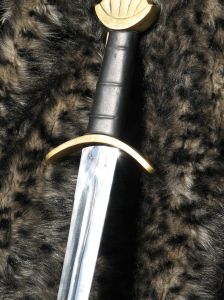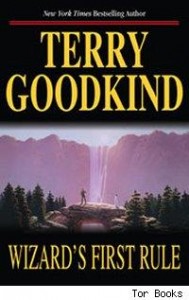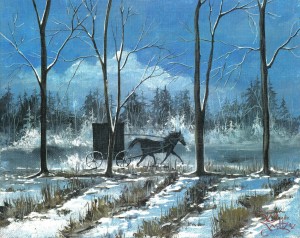After watching Legend of the Seeker, the television series canceled after two seasons that was based on the Sword of Truth book series, I was compelled to actually go and find out what the books were about. I mean, everyone kept saying the books were so much better than the show, and I thought isn’t that true of all film/television adaptations of original books and plays?
So I started off in my journey through the ‘Sword of Truth’ series by getting Wizard’s First Rule, the first in the eleven-book series, to go in a linear path—as I was told that most of the books build off the last, and thus the order was, unlike some series, important. With the Borders cashier giving the final affirmation of the books’ quality over the show, I went off to read the eight-hundred behemoth of a book in the privacy of my room. My expectations were high, and perhaps that was the greatest fault I had going into reading Goodkind’s books.
The show was so good, I thought by the end, how could the book be this bad? But it was. No other time can I really say that a film/television adaptation exceeded the original story (though I’m sure there are plenty others), but this is surely one of them. Either everyone that had read Goodkind’s book were just not bothered by the incessant spelling and grammatical errors and I’m just a grammar Nazi, or we as a culture have just given up on quality literature. The plot, heavy on the fantasy, is set in a seemingly different dimension, focusing on the story of Richard Cypher, the Seeker, and him trying to combat and defeat the apotheosis of evil, Darken Rahl. In a nutshell, that’s the entire story. Unsurprisingly, yet satisfyingly, Richard defeats Goodkind’s symbol of evil.
 Maybe if the book wasn’t so drenched in symbols and feigned profundity, then it could have been a good story. While aspiring to be the next Tolkien, with a little bit of Star Wars (without the sci-fi) at times, Goodkind falls short in many respects—mainly because he was trying to be fucking Tolkien! In the fantasy genre, you just don’t do that. Tolkien was the best, and there’s no surpassing him; whether you’re a fantasy purist or not, it’s simply undeniable of the absolute brilliance of what Tolkien did with The Lord of the Rings trilogy.
Maybe if the book wasn’t so drenched in symbols and feigned profundity, then it could have been a good story. While aspiring to be the next Tolkien, with a little bit of Star Wars (without the sci-fi) at times, Goodkind falls short in many respects—mainly because he was trying to be fucking Tolkien! In the fantasy genre, you just don’t do that. Tolkien was the best, and there’s no surpassing him; whether you’re a fantasy purist or not, it’s simply undeniable of the absolute brilliance of what Tolkien did with The Lord of the Rings trilogy.
Another reason Goodkind fell short was due to his micromanaging of the plot, filling it with minute, useless detail that got repetitive and boring after fifty pages. Perhaps he was trying to give his characters depth, but it turned out being mindless detail after mindless detail. Depth comes from exploring the characters ability to think and ponder upon their consciousness, Mr. Goodkind, and not your very planned-out and detailed description of how they treat a giant red dragon that happens to talk. Not once is it even hinted that Richard Cypher even has a consciousness. Instead, it just seems like he’s a mindless protagonist that just happens to be really good at swinging a sword and treading through the woods without anyone finding him.
And at moments where there were real opportunities for depth, like the love interest unable to completely requite Richard’s advances and his brother’s betrayal, Goodkind falls short by mentioning them only in passing. Otherwise, it was just another story where the good triumphs over all evil, and the world is measured in absolute terms with no grey area. This was not what the show led me to believe the books were about. And yet, that’s the impression given.
So for anyone who had considered actually going out and reading this series, I’d strongly advise you just buy the two seasons on DVD instead.
Wizard's First Rule by Terry Goodkind,




